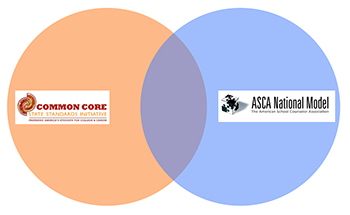Common Core and ASCA Standards, School Counselors, and Career Key

The widespread state adoption of the Common Core State Standards (CCSS) is a challenge and opportunity for school counselors. We describe here the basics of the "Common Core", how they are related school counselors' work, and how the Career Key can help you.
What are Common Core State Standards?
They are a K-12 "set of expectations for student knowledge and skills that high school graduates need to master to succeed in college and careers" in two areas,
- English Language Arts & Literacy in History/Social Studies, Science, and Technical Subjects; and
- Mathematics
You can download printable versions of the Common Core Standards.
How are they related to the ASCA Standards for school counseling programs?
Similarities: They both,
- Share the goals of preparing students to succeed in college and careers,
- Include a curriculum to assist students in acquiring knowledge and skills with a set of identified student outcomes.
Differences: ASCA Standards,
- Intentionally overlap among grade levels. They reflect the variability of student development. The curriculum for the Common Core is linear, one step, leading to another, according to a certain timetable.
- More flexible. The competencies are not meant to be all inclusive, nor mandatory. Instead, they offer a foundation for creating a program that fits your school.
- Inclusive of all students. Not all students are likely to have the ability or background to achieve the Common Core standards at the same level, such as those students who are English Learners.
- Broader in scope. They aim for more than "success in college and careers". They include success in learning and transitions over the life-span; success in life outside of school, college, and work
- Psychological and developmental. The ASCA competencies include terms not found in the Common Core -- like "attitudes", "development", "time and task management", "feelings"; "balance between work and leisure", "self-concept"; "self-knowledge"; "interpersonal skills"; "self-knowledge applications"; and "motivation".
Mutually Supportive. The competencies of the two standards compliment each other. To be successful in college and career, individuals need both.
Students starting college, for example, need to be able to make good decisions, resolve conflicts, have a positive and clear sense of who they are -- in addition to being competent in writing and math.
Why the Common Core Standards are important to you
- Most states have adopted them, 45 by the start of 2014;
- They demand more of students. At the same time, they promise to help students become better prepared for college and careers;
- They demand more of teachers; they will likely feel more stressed and less open to having classroom guidance activities;
- They may affect your job security and effectiveness. In these economic times, it is important to be a valued, supportive member of the school team. Plus, the CCSS anticipate more collaboration among teachers and school professionals.
By collaborating with teachers, you both have the opportunity to be more effective.
New and Exciting Opportunities
As a school counselor, you can play a vital and unique role in this national effort. You can,
- Help parents and students understand and respond constructively to the Common Core standards;
- Advocate for the importance of the ASCA standards to achieve college and career readiness;
- Incorporate the Common Core standards into your classroom guidance lessons.
- Expand your effectiveness by collaborating with teachers. You can strengthen teachers' efforts while having a greater success in achieving the academic, career, and personal social goals of your program.
The Career Key Test as a Basic Building Block

- To begin with, we know that numerous scientific studies have shown that the closer the match between students' Holland personality type and their college major, the more likely they are to succeed. Personality-college major match leads to improved grades, persistence, and timely graduation. Similar studies have found this relationship true for job success and satisfaction.
- In taking the Career Key test students,
- Identify occupations that match their dominant personality types;
- Read about those they identify, and
- Learn about the Holland Theory and what their scores mean, and
- How they relate to choosing a major and career.
- The Career Key test taking experience can creatively be integrated with the teaching of the Common Core standards. Familiarize yourself with the CCSS for the grades you cover and, then, develop a plan with a teacher that enables you both to benefit.
For example, imagine this scenario: You note that a 7th grade CCSS for math is "Use random sampling to draw inferences about a population." And you think, "Hey, how about sampling students' Holland personality profiles (their dominant, first-letter code)?"
The math class would be the "population"; the data would be the RIASEC scores students write down on a slip of paper; and Jane, the math teacher, creates the lesson on sampling a population.
In this way, you support the teacher, and work on ASCA standards, like "Students, will identify personal skills, interests, and abilities and relate them to current career choices." Learning Activities with Overlapping ASCA National Model and Common Core Standards (PDF) shows the standards strengthened in this scenario.
This scenario could be expanded to include other math classes, a report the Language Art teacher has students write . . . The possibilities are only limited by your imagination!
For more, view our free webinar, "Help Middle School Students Get Career/College Ready with Holland's Theory".
Resources
Common Core State Standards
The Common Core's "Frequently Asked Questions" is a rich source of CCSS information.
School Counselor Commentary on the Internet
- Rebecca Lalleir's blog, "SCHOOL COUNSELORS, MEET THE COMMON CORE!" describes how you can apply the Common Core English Language Arts (ELA) standards to classroom, group, and individual work. She also gives you valuable tips for getting started.
- "Heather", a PreK-8 counselor describes how she incorporates the ASCA and Common Core standards in her classroom guidance lessons.
- Literacy Lessons at the ASCA website recommends "literacy-based school counseling curriculum lessons" using children's literature. Many thoughtful ideas and tips.
Statements on the Role of the School Counselor
- American Counseling Association statement, Common Core State Standards, Essential Information for School Counselors. This three-page PDF is a must read for school counselors.
- Achieve: Implementing the Common Core State Standards, Role of the School Counselor
The Career Key
White Papers:
- Choose a College Major Based on Your Personality, What does the research say? Information and advice for students and adults returning to school, as well as parents, counselors, faculty advisors, and education policymakers.
- Personality-College Major Match and Student Success, A Guide for Professionals Helping Youth and Adults Who are in College or are College-Bound
Other Resources
- ASCA and Common Core Standards Addressed In Career Key Test Taking Scenario
- Achieving the ASCA National Standards
- Personality-College Major Match - Why It is Important
- College Student Retention, Completion, Graduation
- Career Key Test, paper-pencil
- Match Up! Your Personality to College Majors
Common Core © Copyright 2010. National Governors Association Center for Best Practices and Council of Chief State School Officers. All rights reserved. American School Counselors Association (ASCA). ASCA National Model. © Copyright 2008 American School Counselor Association. All rights reserved. ASCA National Model© is a registered trademark of the American School Counselor Association. No endorsements are implied or expressed.


